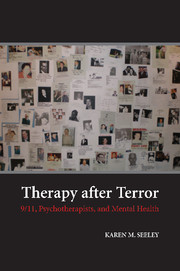Book contents
- Frontmatter
- Contents
- Acknowledgments
- Introduction
- 1 Trauma Histories
- 2 Volunteers for America
- 3 “Get Me Counselors!”
- 4 The Psychological Treatment of Trauma
- 5 The Trauma of Psychological Treatment
- 6 Diagnosing Posttraumatic Stress Disorder
- 7 Trauma as Metaphor
- 8 Mental Health in Traumatic Times
- Notes
- Works Cited
- Index
6 - Diagnosing Posttraumatic Stress Disorder
Published online by Cambridge University Press: 05 August 2012
- Frontmatter
- Contents
- Acknowledgments
- Introduction
- 1 Trauma Histories
- 2 Volunteers for America
- 3 “Get Me Counselors!”
- 4 The Psychological Treatment of Trauma
- 5 The Trauma of Psychological Treatment
- 6 Diagnosing Posttraumatic Stress Disorder
- 7 Trauma as Metaphor
- 8 Mental Health in Traumatic Times
- Notes
- Works Cited
- Index
Summary
As therapists struggled to manage a variety of novel occupational hazards after 9/11, they also grappled with the practical challenges of classifying the psychological injuries of individuals who were wounded in the attack. This chapter examines the practice of diagnosis after 9/11. It begins by considering varying perspectives on psychiatric diagnosis in general before looking at the diagnostic category of posttraumatic stress disorder (PTSD) in particular. It then takes a closer look at the multiple factors that affected mental health professionals' diagnoses of patients after the attack.
PSYCHIATRIC DIAGNOSIS
Like physicians in medical encounters, mental health professionals must diagnose their patients before they can determine the proper treatments to administer. Yet diagnosis has long been a problematic activity in the field of mental health. Perhaps because mental disorders have proven more mysterious and unknowable than physical disorders – because the brain, consciousness, and the processes of thinking and feeling remain less visible, and less comprehensible, than the workings of kidneys and spleens – there has been markedly less agreement in the identification and classification of their malfunctions. It has not been uncommon for various practitioners to diagnose the same patients differently, or for patients with similar symptoms to receive dissimilar diagnoses. In previous decades, diagnostic consensus has occurred with remarkable infrequency. According to one extensive study, mental health professionals agreed on diagnoses of particular patients in as few as four of ten clinical cases (Beck 1962).
- Type
- Chapter
- Information
- Therapy after Terror9/11, Psychotherapists, and Mental Health, pp. 125 - 146Publisher: Cambridge University PressPrint publication year: 2008



